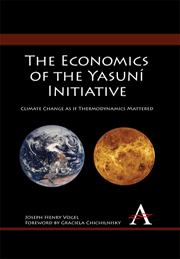Book contents
- Frontmatter
- Contents
- Prologue
- Foreword
- Introduction
- Acknowledgements
- Abbreviations and Acronyms
- The Economics of the Yasuní Initiative
- Chapter 1 Thermodynamics
- Chapter 2 The Tragedy of the Commons
- Chapter 3 The Willful Ignorance of Realpolitik
- Chapter 4 The General Theory of Second Best
- Chapter 5 Through the Bottleneck of a Cowboy Economy
- Conclusions
- Appendix: Annotated YouTube Filmography
- Ordering
- Notes
- Index
Chapter 2 - The Tragedy of the Commons
A Class of Problems that has no Technical Solution
Published online by Cambridge University Press: 05 March 2012
- Frontmatter
- Contents
- Prologue
- Foreword
- Introduction
- Acknowledgements
- Abbreviations and Acronyms
- The Economics of the Yasuní Initiative
- Chapter 1 Thermodynamics
- Chapter 2 The Tragedy of the Commons
- Chapter 3 The Willful Ignorance of Realpolitik
- Chapter 4 The General Theory of Second Best
- Chapter 5 Through the Bottleneck of a Cowboy Economy
- Conclusions
- Appendix: Annotated YouTube Filmography
- Ordering
- Notes
- Index
Summary
“The Tragedy of the Commons” opens with a salvo from two nuclear scientists who had thought long and deeply about the arms race between the superpowers: “It is our considered professional judgment that this dilemma has no technical solution” (italics in original). Garrett Hardin expands upon that judgment and perceives that a whole class of problems exists that have no technological solution. The question arises: do climate fluctuations belong to that class?
One does not need to summon the spirit of Hardin to imagine his answer. A section of “The Tragedy of the Commons” is entitled “pollution” and Hardin explains that “it is not a question of taking something out of the commons, but of putting something in…dangerous fumes in the air.” What then would be Hardin's reaction to the article “Keys to Climate Protection” which opens with “Technology policy lies at the core of the climate change challenge”? The author, Jeffrey D. Sachs, is arguably the world's leading development economist and the magazine, Scientific American, arguably the most august in American science. How would Hardin have reacted to the Sachs' short list of promising technologies? Topping that list is “Carbon Capture and Sequestration” (CCS) which “…depends on the ability to capture carbon dioxide at the power plant at low cost, transport it by pipeline over significant distances, and sequester it underground safely, reliably and durably.”
- Type
- Chapter
- Information
- The Economics of the Yasuní InitiativeClimate Change as if Thermodynamics Mattered, pp. 13 - 26Publisher: Anthem PressPrint publication year: 2010



